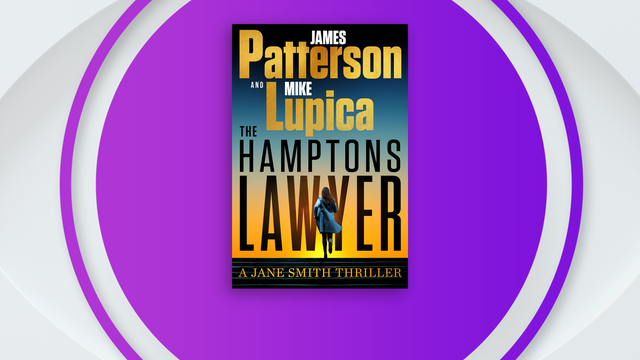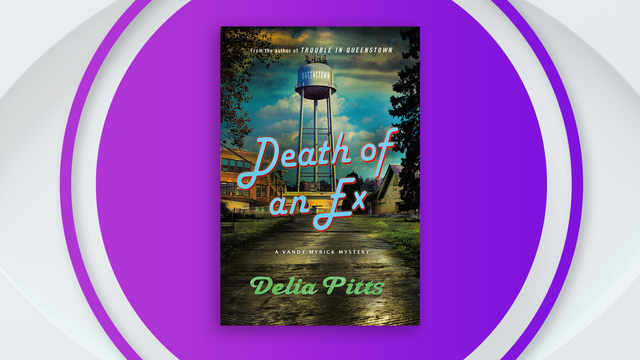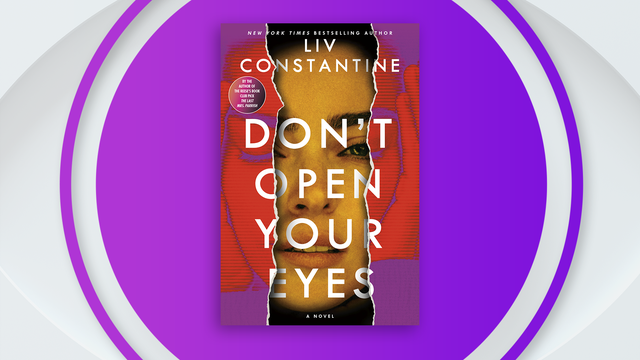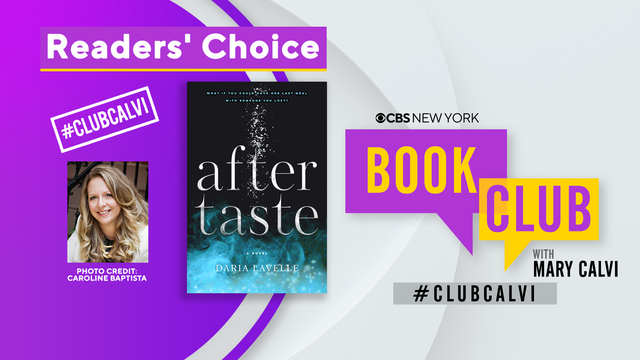"Finding Margaret Fuller" voted the Readers' Choice for Club Calvi
Please consider joining our Facebook group by CLICKING HERE.
This content is sponsored by Cohen's Fashion Optical.
Find out more about the books below.
CBS New York Book Club readers select their spring read!
The results are in after thousands of votes were cast for this round of Top 3 FicPicks.
You selected "Finding Margaret Fuller" by Allison Pataki as the Readers' Choice.
"Finding Margaret Fuller" is a work of historical fiction, based on the life of Margaret Fuller. Allison Pataki calls Fuller "America's forgotten leading lady." She was a center of the literary world in New England, an activist for women, a newspaper columnist in New York, and the first female foreign news correspondent when she finds romance and scandal.
Now it's time to get your copy of "Finding Margaret Fuller" and read along with us over the next four weeks, leading up to our Book Club show next month.
Click here to find out more about each of the FicPicks we considered this round.
Prefer to listen? Audible has a 30-day free trial available right now.
"Finding Margaret Fuller " by Allison Pataki
From the publisher: Young, brazen, beautiful, and unapologetically brilliant, Margaret Fuller accepts an invitation from Ralph Waldo Emerson, the celebrated Sage of Concord, to meet his coterie of enlightened friends. There she becomes "the radiant genius and fiery heart" of the Transcendentalists, a role model to a young Louisa May Alcott, an inspiration for Nathaniel Hawthorne's Hester Prynne and the scandalous Scarlet Letter, a friend to Henry David Thoreau as he ventures out to Walden Pond . . . and a muse to Emerson. But Margaret craves more than poetry and interpersonal drama, and her restless soul needs new challenges and adventures.
And so she charts a singular course against a backdrop of dizzying historical drama: From Boston, where she hosts a salon for students like Elizabeth Cady Stanton; to the editorial meetings of The Dial magazine, where she hones her pen as its co-founder; to Harvard's library, where she is the first woman permitted entry; to the gritty New York streets where she spars with Edgar Allan Poe and reports on Frederick Douglass. Margaret defies conventions time and again as an activist for women and an advocate for humanity, earning admirers and critics alike.
When the legendary editor Horace Greeley offers her an assignment in Europe, Margaret again makes history as the first female foreign news correspondent, mingling with luminaries like Frédéric Chopin, William Wordsworth, George Sand and more. But it is in Rome that she finds a world of passion, romance, and revolution, taking a Roman count as a lover—and sparking an international scandal.
Allison Pataki lives in New York.
"Finding Margaret Fuller" by Allison Pataki (Hardcover) $23
"Finding Margaret Fuller" By Allison Pataki (Kindle) $15
Excerpt: "Finding Margaret Fuller" by Allison Pataki
Chapter One
Concord, Massachusetts
Summer 1836
I know that Mr. Emerson is expecting me. It was he, after all, who invited me here. And yet, as I approach the front door of his grand white home, I feel a twinge of nerves. I pause, staring up at the house, an imposing structure set back from the Cambridge Turnpike, hemmed by a fence, the columned porticoes and rolling green lawns lending the place a simple, stately elegance. "Bush" is what Mr. Emerson called the estate in his letters, when he wrote to invite me from Cambridge out to the country for a week's visit.
He'd read my newspaper tribute, Mr. Emerson explained, to his beloved brother Charles, so recently deceased of tuberculosis. He'd found that my words had touched his heart, providing some small balm to the pain of the untimely loss. I was a young writer of great promise, Mr. Emerson declared, his fine cursive filling the front and back of the page. As one of New England's most established lecturers and perhaps its most prolific writer, he, Mr. Ralph Waldo Emerson, took great pride in being able to support individuals like me. Even women, his words implied, though he had not stated that outright. But really, he hastened to add, the primary purpose of the visit was to provide companionship for his wife, Mrs. Lidian Emerson, now in the final months of her confinement before the expected arrival of their first child, and barely able to leave her bed.
"He's collecting friends and thinkers to his side," Eliza Peabody had told me, when she welcomed me into her Boston parlor for tea on the eve of my planned departure. Eliza, my friend of several years, and I had gravitated toward each other as two of the only young ladies in the Boston and Cambridge writing circles who shared the twin stains on our reputations of being unwed and wishing to work as published writers. We had an audacity to us that frightened many, an independence of spirit and circumstance that made us not a little bit threatening to some of the men who wrote about freedom and lectured about liberty. An independence that allowed me to accept an invitation such as this one from Mr. Emerson, to stay as his houseguest in the country.
Eliza was in a position to tell me what I might expect from a visit at Emerson's estate, as she herself had made the very same three-hour journey by stagecoach from Boston to Concord on more than one occasion to accept a similar invitation—or was it a summons?— to the Emerson home.
"He knows of you, Margaret. Knows your reputation, evidently even knows some of your writing," Eliza said, stirring a pinch of sugar into her tea as she held me with her intense, inquisitive gaze. I did my best to bite back the flattered smile that pulled on my lips. To think, my work had been read—and enjoyed—by a man such as Ralph Waldo Emerson. Certainly there were many who found my work and my passions unladylike, even unnatural. But not Mr. Emerson, it seemed.
Eliza went on: "Sophia and I were with the Emersons out at Bush in the spring." While Eliza was a celebrated wit and lady of letters, her sister Sophia was known to excel at painting. "It promises to be interesting, my dear, to say the least. A chance to glimpse the great Sage of Concord at home."
And now here I stand, clutching my cloth bag and gazing at the front door of Mr. Ralph Waldo Emerson's home. I glance down at my dress, a simple poplin of dove gray, a cream-colored kerchief tied modestly around my neck. I pat the skirt and then raise my gloved hands to make certain that my chestnut bun is tidy, the curls bobbing down the nape of my neck, giving myself one final prink before I knock.
I'm expecting a servant of some sort, perhaps a housekeeper or cook, but the man who greets me at the door is none other than Mr. Ralph Waldo Emerson himself—I know his famous face. "Oh, yes, Mr. Emerson?" I shift my bag from one hand to the other, forcing a bright tone even as I feel my cheeks grow warm. "Hello."
Mr. Emerson looks at me, one corner of his mouth tilting upward, the hint of a half smile, and then he extends a hand in greeting. "And this must be the famous Margaret Fuller of Cambridge at my doorstep?"
I take his outstretched hand and let out a puff of breath that sounds like a warble. I'm struck by the deep timbre of his voice, and by his informal manner—I hadn't expected either. Already he's caught me back on my heels, so I square my shoulders and summon a casual smile as I reply: "I don't know about famous, but I am Margaret Fuller indeed."
His smile grows from partial to full as his blue-gray eyes catch a lively glimmer. And then he sweeps his arm up, performing a slightly theatrical bow. "Welcome to Concord. Please, Miss Fuller, won't you come inside?"
I accept his welcome and step past him, out of the warm summer afternoon and into the cool and airy quiet of the Emerson home. The foyer is bright and high ceilinged, with a gracious stairway and wooden banister before us and spacious rooms off to each side. I stand still as my host asks after my journey and I tell him it went smoothly. There is neither sight nor sound of any other person in the home, which lends the handsome place an almost temple-like tranquillity. I clutch my valise as Mr. Emerson ushers me across the front hall and into a room lined with books. His study, I suppose. A large mahogany desk occupies pride of place, topped with a tidy stack of papers and a pen tipped into a dish shaped like a bird. Beside it sits a half-filled inkwell. The room smells of books and firewood.
Mr. Emerson stands beside his desk. "What refreshment can I offer you, Miss Fuller, after your hours-long journey? Some tea? Coffee? Water? Ah, or we do have some nice cider which our dear handyman has pressed for us."
"Water would be fine," I answer. As he pours us two cups from a pitcher on a nearby side table, I take the opportunity to subtly study his appearance. Ralph Waldo Emerson is tall and slender, dressed in a tidy suit with a cravat that hugs high and tight around his neck. I know from his reputation as a great speaker and writer that Mr. Emerson is a few years older than me, thirty-three to my twenty-six. Nevertheless, he has an undeniably youthful vitality about him; perhaps someone so filled with deep thoughts and ideas cannot help but overspill with an uncoiled sort of energy.
"Thank you." I accept the water from his hand and take a sip. Our eyes lock for a moment and I allow my stare to linger in his cool gaze, before I remind myself to look away. I take another sip, my throat feeling dry, and I tell myself it's because of the three hours on the turnpike.
Excerpted from Finding Margaret Fuller by Allison Pataki. Copyright © 2024 by Allison Pataki. All rights reserved. No part of this excerpt may be reproduced or reprinted without permission in writing from the publisher.









